Contents
part III: the person
'This
also shows what the identity of
the same man exists in
namely a participation in the same
continued life
by constantly fleeting particles
of matter
that are successively vitally
united to the same organized body.'
John
Locke (1632-1704) in:
'Essay Concerninbg Human
Understanding
- XVII, identity and diversity 6'
Introduction
Control,
identity en the ideal
In part II
have
we dealt with the principles. With
them we arrived from the art of
analysis at what we call spiritual
association, the spirituality. We
saw how the factor of time played
a part in the relationship between
master and slave: the spirit and
the body. From part I we
already knew that a pure
consciousness is also a matter of
science; a matter of seeing things
as they are, of being free from
illusion. If we nevertheless find
ourselves in a state of illusion
though, if it is so that, even
though we're scientifically in
order and analytically dependable
engaged with the principle, we
turn out not to be unified in the
self of the soul, do we at that
time say that we've fallen down.
Some or another way have we lost
our way in the fallen state and
ran we into bewilderment. We then
have a psychological problem, a
problem of control; in the
illusional state we have a
so-called problem of authority or
we're not pure anymore in the
relation between spirit and body
then, we do not know any longer
who the master and who the slave
would be. With problems of
authority one has illusions of
control: either one is paranoid on
being controlled by others or one
landed in the illusion that the
mission of self-control would
consist of the duty to control
someone else. In the fallen state
does one, departing from an
individual illusion, together with
others slide down in a common
illusion of a 'society' finding
itself in the chaos of the state
of no longer properly cooperating
people.
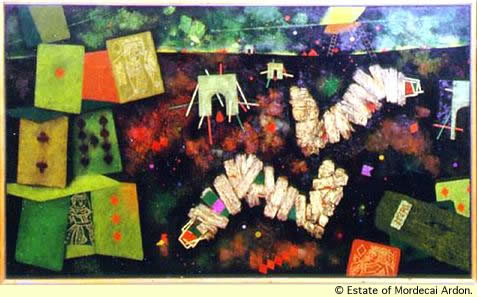
We
have no clue anymore what we're
up to then, what we're supposed
to do, and who we are. We so
have a problem of identity, a
problem with the servitude and a
problem with the knowledge and
are burdened with the assignment
to solve that problem. Like bees
whose honey was stolen by the
beekeeper, we then get
sugarwater, a surrogate for
temporarily relieving the
greatest hunger until the
integrity is restored with us
having a grip again on our
individual and communal life.
The problem of identity we solve
provisionally with
ego-ambitions: better to keep up
appearances with an I-prophesy
than give it up all together. We
likewise solve the problem of
servitude as well by laboring
for the money, even though we,
with an indefinable and uneasy
feeling of estrangement, have
our heart no longer to it. It's
a big lie that self-interest not
so precise with the rules, but
O.K. And the problem of
knowledge we solve by reading
out aloud sermons with or
without the help of
'thought-protheses' or books.
Also fine, all that pedantry of
'sir minister'. No longer seeing
it as clearly, no longer being
as conversant, one uses
spectacles, one uses 'mentures'
or a 'thought-prothesis', a
book. That
book also is but an artificial,
not really to the here-and-now
adapted, fixation, but just as
with the glasses that have a
fixed lens-focus, is one
satisfied with one's favorite
author or holy scripture for
that matter. Thus received e.g.
the controversial novel Catcher
in the Rye of J.D. Salinger (born
1919) from 1951, a cult-status
for being the support and refuge
for loners and dropouts who lost
it with the lies of bourgeois
materialism. The book shows, in
the struggle for adulthood of
the leading character Holden,
the world of the 'phonies', the
fake-people or the hypocrites,
but of course is the book itself
also but a fake-idea and
factually thus caught in a
projection. With books holier
the advise is then 'judge not'
or is it like Vy‚sa says (in
S.B. 11.28:
1): 'be
free from praise and criticism
with regard to someone else's
actions'. All those before
mentioned cases of temporary
solutions we call the
compensations of a failed
identity, a failed servitude and
a failed integrity of knowing.
If we don't want to get sick of
it, do we, in order to remedy
that, in fact consequently have
to reason back to the point
where it went wrong, were we
came to a fall, but do we
thereupon see our way blocked by
a couple of psychological
mechanisms. One apparently came
to a fall, but one has to keep
one's faith in oneself and so
one made it a life of justifying
the fall-down and is one not
just as easily capable any more
to figure out on one's own
accord what exactly the fall
down or the rising to one's feet
would be. Something has
disappeared into the
'unconscious'. And even
though one so now and then sees
some half of the truth in one's
sleep or in an upsurge of
intelligence, one very quickly,
like being one's own enemy, then
pushes that away again. For it's
not possible to say to yourself
all the time that you're wrong,
or were wrong at all even, and
that you'd be at odds or not
good-willing. Those who do
engage in telling that
themselves without a further
plan, find themselves in the
grip of a so-called depression:
they cannot retrieve their
self-esteem and motivation
anymore for they are overwhelmed
by the contrary of a closet full
of things tucked away that all
at once, in a crisis, fell over
them and crushed their
self-respect. Thus are we in our
normal waking state 'consonant
with ourselves' as the
psychologists call it (viz. the
social psychologist Leon
Festinger
1919-1989), and are we our best
friend as we already saw in the
Small
Philosophy of Association, and
do we rather distrust the other
than ourselves with the notion:
'when I'm not able to get on top
of things, then you for sure
neither - but if you act as if
you would then I for sure are
better off in facing the
problem' - even though I'm just
as well down in the dark then.
Thus there's never an end to the
psychological complexes and
together we so go downhill when
we as 'friends of ourselves' do
not manage to know the
compensations, to cut with them,
as we already saw, and then get
out of it all together with a
better order of time being more
grounded in the discipline. To
keep our health we have to
escape the temporary provision
of compensations, that bad
system that separated time from
place and reduced it all to a
linear rut and thus disturbed
our dynamical feeling of life of
being connected with the planet
and with each other. That
book also is but an artificial,
not really to the here-and-now
adapted, fixation, but just as
with the glasses that have a
fixed lens-focus, is one
satisfied with one's favorite
author or holy scripture for
that matter. Thus received e.g.
the controversial novel Catcher
in the Rye of J.D. Salinger (born
1919) from 1951, a cult-status
for being the support and refuge
for loners and dropouts who lost
it with the lies of bourgeois
materialism. The book shows, in
the struggle for adulthood of
the leading character Holden,
the world of the 'phonies', the
fake-people or the hypocrites,
but of course is the book itself
also but a fake-idea and
factually thus caught in a
projection. With books holier
the advise is then 'judge not'
or is it like Vy‚sa says (in
S.B. 11.28:
1): 'be
free from praise and criticism
with regard to someone else's
actions'. All those before
mentioned cases of temporary
solutions we call the
compensations of a failed
identity, a failed servitude and
a failed integrity of knowing.
If we don't want to get sick of
it, do we, in order to remedy
that, in fact consequently have
to reason back to the point
where it went wrong, were we
came to a fall, but do we
thereupon see our way blocked by
a couple of psychological
mechanisms. One apparently came
to a fall, but one has to keep
one's faith in oneself and so
one made it a life of justifying
the fall-down and is one not
just as easily capable any more
to figure out on one's own
accord what exactly the fall
down or the rising to one's feet
would be. Something has
disappeared into the
'unconscious'. And even
though one so now and then sees
some half of the truth in one's
sleep or in an upsurge of
intelligence, one very quickly,
like being one's own enemy, then
pushes that away again. For it's
not possible to say to yourself
all the time that you're wrong,
or were wrong at all even, and
that you'd be at odds or not
good-willing. Those who do
engage in telling that
themselves without a further
plan, find themselves in the
grip of a so-called depression:
they cannot retrieve their
self-esteem and motivation
anymore for they are overwhelmed
by the contrary of a closet full
of things tucked away that all
at once, in a crisis, fell over
them and crushed their
self-respect. Thus are we in our
normal waking state 'consonant
with ourselves' as the
psychologists call it (viz. the
social psychologist Leon
Festinger
1919-1989), and are we our best
friend as we already saw in the
Small
Philosophy of Association, and
do we rather distrust the other
than ourselves with the notion:
'when I'm not able to get on top
of things, then you for sure
neither - but if you act as if
you would then I for sure are
better off in facing the
problem' - even though I'm just
as well down in the dark then.
Thus there's never an end to the
psychological complexes and
together we so go downhill when
we as 'friends of ourselves' do
not manage to know the
compensations, to cut with them,
as we already saw, and then get
out of it all together with a
better order of time being more
grounded in the discipline. To
keep our health we have to
escape the temporary provision
of compensations, that bad
system that separated time from
place and reduced it all to a
linear rut and thus disturbed
our dynamical feeling of life of
being connected with the planet
and with each other.
With
one's looking for solutions
arriving at the compensations of
the ego, the labor and the
books, we also get into trouble
with the person. The other may
physically not rule us over,
that we have to do ourselves.
That we remembered from our
education: we have to be grown
up and take our responsibility.
Your daddy and mom aren't there
any  longer
and you even rejoice in it. But
by making yourself the authority
will the other not just like
that be appreciative of or
subservient to that ego, for the
other person knows that game of
compensations very well himself.
We do not without a problem
expect the other to be holy in
following the principles and
thus one assumes that everyone
must be compensating, for that's
something normal. The division
stays and despair dominates
one's life-experience, for one
carries water to the sea with
it: nothing is won with a
(notion of a) charade, there's
no real progress then. For the
materially motivated ego of
outer appearances existing there
for it's own sake is not the
solution really. And that's also
true for paid labor and books.
If one does one's job for the
money only, one is not really
dependable and books most of the
time are a lot of grousing with
a glaze of a partly
self-invented world from which
one also has to wake up again to
discover that, even though one
might dream, one in reality is
still implacably the slave of
the circumstances and the senses
thereto, in stead of being the
master of one's fate. And thus
we are what the british
psychiatrist R. D.
Laing
(1927-1989) in the sixties
called the, circumstantially
created, divided self of the man
who outside is a fool victimized
by the compensation culture with
all her fake appearances and
conflicting psychology, but at
the inside is a god full of
ideals and qualities opposed to
that with a certain frustration
over the inability to realize
oneself, to prove oneself. longer
and you even rejoice in it. But
by making yourself the authority
will the other not just like
that be appreciative of or
subservient to that ego, for the
other person knows that game of
compensations very well himself.
We do not without a problem
expect the other to be holy in
following the principles and
thus one assumes that everyone
must be compensating, for that's
something normal. The division
stays and despair dominates
one's life-experience, for one
carries water to the sea with
it: nothing is won with a
(notion of a) charade, there's
no real progress then. For the
materially motivated ego of
outer appearances existing there
for it's own sake is not the
solution really. And that's also
true for paid labor and books.
If one does one's job for the
money only, one is not really
dependable and books most of the
time are a lot of grousing with
a glaze of a partly
self-invented world from which
one also has to wake up again to
discover that, even though one
might dream, one in reality is
still implacably the slave of
the circumstances and the senses
thereto, in stead of being the
master of one's fate. And thus
we are what the british
psychiatrist R. D.
Laing
(1927-1989) in the sixties
called the, circumstantially
created, divided self of the man
who outside is a fool victimized
by the compensation culture with
all her fake appearances and
conflicting psychology, but at
the inside is a god full of
ideals and qualities opposed to
that with a certain frustration
over the inability to realize
oneself, to prove oneself.
This
section deals with the
restoration of that respect for
the person that one in one's
full glory is at the inside,
about the cure, the becoming,
which the psychologist Carl Rogers
(1902-1987) in 1974 called
'becoming a person'. It's about
the emphatically approached
person who consequently is able
to get back on his feet again
with the realization of what
actually the fallen state would
be, what exactly at the moment
would be his flaws of reasoning,
his errors, his confusion on
norms, standards and needs, and
what his foolishness would be.
But it is also about the person
not so much of compensation, the
person who is of God or who is a
god himself and who constitutes
an ideal, is the redeemer, the
great leader, the savior, the
spiritual master, the hero and
the great beacon, the example,
the source of wisdom and the
control over the universe in the
flesh. The latter is inevitable:
desiring respect for the person
one is oneself, will the other
person also have to be
respected, if one wants to put
an end to the discord of the
material ego-interest. The at
first instance, more or less
being infatuated, realizing of
the inequality with a high - or
sometimes too high - opinion of
that other person in the form of
a Great Personality, is there
because of the karmic reaction
of tipping over to the other
extreme of having respect, for
the control of the equilibrium
wasn't there without a problem.
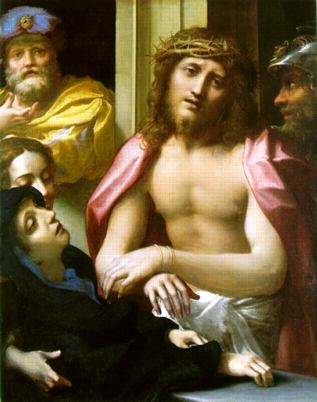 As a
child one realized oneself maybe
one's father, as an adult that
continues with the ideal of a
godhead who also carries the
name of the Father then. And for
not a few consists the problem
of selfrealization of the fact
that indeed Great Personalities
do exist, whether still around
or not anymore, to look up to
and to learn from. To rid
oneself of the inequality is
there, also according the Great
Personalities, the need of a
process of emancipation, a
process of becoming equal, a
process of spiritual growth, a
therapeutic process. Out of fear
for the false ego of the man of
appearances and lies, do we
therewith following speak of the
holiness that's supposed to be
free from it and of which we
hope it is not sanctimonious
like it is with e.g. priests
violating kids, popes who ordain
the death of others, sect
leaders driving for suicide and
spiritual leaders out for their
own material advantage. We so
speak of belief: in the fallen
state it is difficult to believe
and has one a problem of
authority, but back on one's
feet one all of a sudden
recognizes an ally in that
example that offers support and
so is thus finding faith in a
leader, a Lord, a therapist
and/or a guru the way out of the
fallen state. And that's not
only true for the holiness, no,
an artist honestly capable of
grousing at all the
sanctimoniousness is preferred
over the obedient citizen who
wasn't quite as capable of being
artful with that less wanted
presentation of the truth.
Sometimes is the interest of the
ideal overruled by the interest
of it's manifestation. And that
can be a shocking discovery with
the example of therapists ending
in bed with their clients or
gurus who almost
incomprehensibly take over your
sexual karma and the rest of it. As a
child one realized oneself maybe
one's father, as an adult that
continues with the ideal of a
godhead who also carries the
name of the Father then. And for
not a few consists the problem
of selfrealization of the fact
that indeed Great Personalities
do exist, whether still around
or not anymore, to look up to
and to learn from. To rid
oneself of the inequality is
there, also according the Great
Personalities, the need of a
process of emancipation, a
process of becoming equal, a
process of spiritual growth, a
therapeutic process. Out of fear
for the false ego of the man of
appearances and lies, do we
therewith following speak of the
holiness that's supposed to be
free from it and of which we
hope it is not sanctimonious
like it is with e.g. priests
violating kids, popes who ordain
the death of others, sect
leaders driving for suicide and
spiritual leaders out for their
own material advantage. We so
speak of belief: in the fallen
state it is difficult to believe
and has one a problem of
authority, but back on one's
feet one all of a sudden
recognizes an ally in that
example that offers support and
so is thus finding faith in a
leader, a Lord, a therapist
and/or a guru the way out of the
fallen state. And that's not
only true for the holiness, no,
an artist honestly capable of
grousing at all the
sanctimoniousness is preferred
over the obedient citizen who
wasn't quite as capable of being
artful with that less wanted
presentation of the truth.
Sometimes is the interest of the
ideal overruled by the interest
of it's manifestation. And that
can be a shocking discovery with
the example of therapists ending
in bed with their clients or
gurus who almost
incomprehensibly take over your
sexual karma and the rest of it.

With the
negation or recognition of the
other in the struggle for
getting attention for one's own
person is it as with the
legendary Baron
Munchausen who
pulled himself by his own hairs
out of the swamp: 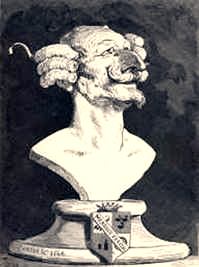 once
one in faith has been converted
to the positive confession, has
one to realize a position of
being liberated, viz to serve
the cause, if one wants to
escape one's swamp. That other
person one eventually is oneself
and who does manage to keep to
the soul, serve the cause and
know his trade, must be clear in
the eye of one's mind. The dutch
psychologist J. J. van der Werff
spoke in 1965 of self-image and
self-ideal in his book with the
same name: it concerns a
division without which a human
being paradoxically can't be
happy or even be healthy and
sane. One is necessarily divided
being honest about the fact that
one inescapably as a person is
of limitations, faults, errors,
misperceptions, and miseries in
one's material life at the one
hand, while at the other one has
to counterbalance with a self
more durably happy, more capable
and of less faults and errors.
The way we from part one to part
two arrived from a person free
from illusion that is one with
the universe at a person
identified with the matter of
not being so sure anymore of the
oneness with the realization of
the good and bad of having
principles, do we from that
innerly divided, analytically
and spiritually seeking man
arrive at the ideal man we must
manage to realize, we must put
faith in as an ever on our
approach receding horizon of
qualities and integrity who we
within ourselves have to realize
as someone knowing his trade
(vedically: is the caittya-guru).
And thus do we, from the
personal realization of our
inability, arrive at the
problems of religion and
politics. once
one in faith has been converted
to the positive confession, has
one to realize a position of
being liberated, viz to serve
the cause, if one wants to
escape one's swamp. That other
person one eventually is oneself
and who does manage to keep to
the soul, serve the cause and
know his trade, must be clear in
the eye of one's mind. The dutch
psychologist J. J. van der Werff
spoke in 1965 of self-image and
self-ideal in his book with the
same name: it concerns a
division without which a human
being paradoxically can't be
happy or even be healthy and
sane. One is necessarily divided
being honest about the fact that
one inescapably as a person is
of limitations, faults, errors,
misperceptions, and miseries in
one's material life at the one
hand, while at the other one has
to counterbalance with a self
more durably happy, more capable
and of less faults and errors.
The way we from part one to part
two arrived from a person free
from illusion that is one with
the universe at a person
identified with the matter of
not being so sure anymore of the
oneness with the realization of
the good and bad of having
principles, do we from that
innerly divided, analytically
and spiritually seeking man
arrive at the ideal man we must
manage to realize, we must put
faith in as an ever on our
approach receding horizon of
qualities and integrity who we
within ourselves have to realize
as someone knowing his trade
(vedically: is the caittya-guru).
And thus do we, from the
personal realization of our
inability, arrive at the
problems of religion and
politics. 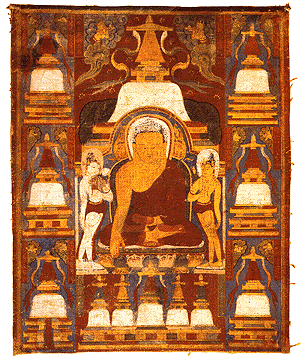 The
religion is the social
organization of the respect for
the ideal person in the context
of a certain order of time, and
the political constitutes the
actuality of the problematic,
but necessary respect for also
the maybe not always as holy
person, in which one is engaged
in telling each other what
actually should be the order of
time in 'reality', how late it
'really' is and how the book of
law 'actually' should look like.
What would now be the priority
of the needs of the necessary
succession of deeds - like the
humanist and psychologist A. Maslow (1908-1970)
put it - once we at the one hand
religiously know of the Original
Person while we in terms of
behavioral science at the other
hand have accepted as being
inevitable - with or without a
so-called peak-experience of
being on our way - what the
ideal is of that person who in
India is called the purusha?
How to tell each other how late
it is, or what we're up to, with
the religion and with the
politics? Or .... was it, as we
already saw in part I and II,
more a matter of self-control
and sense of reality, that
identifying ourselves with the
great example of self-control of
the Controller of Yoga, who in
case of proven wisdom and
recognizable incarnation
vedically also is given the
honorary title of yogis'vara? The
religion is the social
organization of the respect for
the ideal person in the context
of a certain order of time, and
the political constitutes the
actuality of the problematic,
but necessary respect for also
the maybe not always as holy
person, in which one is engaged
in telling each other what
actually should be the order of
time in 'reality', how late it
'really' is and how the book of
law 'actually' should look like.
What would now be the priority
of the needs of the necessary
succession of deeds - like the
humanist and psychologist A. Maslow (1908-1970)
put it - once we at the one hand
religiously know of the Original
Person while we in terms of
behavioral science at the other
hand have accepted as being
inevitable - with or without a
so-called peak-experience of
being on our way - what the
ideal is of that person who in
India is called the purusha?
How to tell each other how late
it is, or what we're up to, with
the religion and with the
politics? Or .... was it, as we
already saw in part I and II,
more a matter of self-control
and sense of reality, that
identifying ourselves with the
great example of self-control of
the Controller of Yoga, who in
case of proven wisdom and
recognizable incarnation
vedically also is given the
honorary title of yogis'vara?
Contents
section IIIa: the personal
Self-knowledge,
reformation and identity
'God, like the tradition
tells us,
has in His grip the beginning, the
middle and the end of all things
and in His fixed course, according
nature,
takes He everything to it's
destination.
Him always accompanies DikŤ2, of
retribution
to all who do not fulfill the
divine law.
Who wants to be happy and
felicitous,
better respects her from the
beginning.'
Plato quoted by Aristotle
in: About the Cosmos
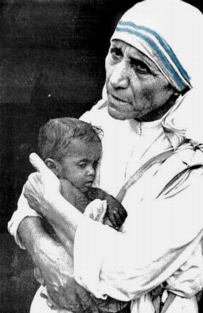
In the
search for the self of durable
happiness and knowledge we so
cannot escape the person, nor the
necessity to respect that person,
that one is oneself as well, also
in a material sense. Therefore
splits, filognostically, the
respect for the person itself up
in a personal/religious and a
political/futurological section.
With the personal do we in our
scientifically founded, methodical
selfrealization wrestle with the
holiness and the authentic
experience of the 'Absolute
Truth', and concerned with the
material interest do we wrestle
with the politics of time-systems,
identities, commentaries, the
authority, the last word, the
advantage of doubt, the law, the
economy, the responsibility and
the future, that we as adults to
it, as we just saw, with the
necessity of a certain self-ideal,
also need.
From
part one we already knew to make
for a good division in accord
with the order of nature, an
order which, lawful as it is,
provides certainty, offers the
certain knowledge that cannot be
doubted by anyone. On the basis
of this certainty we in part two
arrived at the bold venture of
learning the art to live with
the duality inherent to the
analytical and with the
qualities inherent to the
spiritual self we cannot live
without either with the
philosophy of liberation. Now,
having arrived at the interest
of the person, are we faced with
the question that is classical:
'who am I?'. Vedically the
answer is simply 'soham'
which literally means 'I
myself'. One also says 'tat
tvam asi' or 'that thou
art' to indicate that the
reality of the I contains a
relation with the reality and
the principle (tat) of
the universe comprising the
other. Without that relation
carries the I-awareness with God
no reality. The I without the
other is, considering the
inevitability of the duality, an
illusion of separateness that
must be overcome with what
vedically is called karuna,
day‚, bh‚va or prema:
kindness, compassion, affection
and love. From Plato we in the
West learned also that God, or
better stated the way to God,
must be considered the good
which with Vy‚sa is called
sattva or the mode (guna)
of goodness (S.B.
7.15: 25).
Sinful acting is thus seen
nothing but the acting which,
causing sorrow and grief, goes
against the goodness, and
serving God is the consequence
of devoting oneself to this
realization of the I that then
no longer is called false but is
called a soul, a conscientious
self of principles, of norms and
standards. As for the concept of
God says Aristotle in About
the Cosmos: 'God is one,
but with many names, derived
from all phenomena he time and
again brings about, he is
addressed ' .... he is called
the son of kronos and the Time
(Chronos), because his existence
continues from the one endless
eon on earth to the other; ...I
also dare say that 'Necessity'
is but another name for him,
since he is the invincible cause.'
The discovery of this True Self
of the soul of this Original
Person, who thus according the
greek root of philosophy is also
identified with the concept of
time and necessity, can, via the
mode of goodness not take place
but along the ways of having
respect for the other who we,
with ourselves included, may not
cause any grief. The ego in his
falsehood poises itself against
the negativity about all the
rest that needs to be excluded
for the sake of material action,
we saw in the
NOT-paradigm of part I. That
negation, that denial of saying
no, is essential for one's
material action. It can't be
otherwise. For the practice of
Christianity we in Europe thus
at the end of the Middle Ages
knew, with this saying in mind,
Martin
Luther
(1483-1546)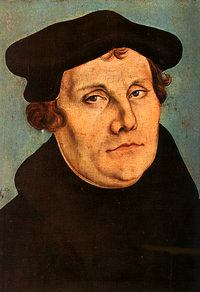 who
exposed the fallen state of the
fundamentalistic-dictatorial
influence of the Catholic
Church. Result of his heroism
was that the church after due
centuries of struggling on was
dethroned from that position of
absolute power and had to learn,
just like any other possible
form of class-corruption, neatly
and modestly to settle for a
normal position in the
fields of action of the
individual citizen as discussed
in part I. Christianity was at
the end of the Middle Ages no
longer the same Christianity,
but had collapsed into a
theology divided in itself, a
factually fallen culture that
later on difficulty facing the
lesson of the philosophy of
Enlightenment as a lecture in
adulthood and (also religious)
self-responsibility. Pope
Gregory's calendar-reform
shortly after the Middle Ages
1582 wouldn't be of much avail
against that confusion. There
was more at stake than the
matter of the order of time. The
system in it's entirety didn't
accord any longer with nature,
but the
reformist/contra-reformist
restoring with a rule of time
that respect for the reality of
God's creation couldn't revoke
the dividedness that had risen,
despite of all the burning of
heretics and breaking of idols.
Like Thomas
Kuhn (1922
- 1996) pointed it indirectly
out in 1962 with his study about
the nature of the revolutions of
scientific paradigms, followed
in the year zero the thought
model of Christianity a
revolutionary way that model of
Judaism and followed Islam seven
centuries later historically
with the same heroism the
Christian vision, whereupon next
after the revival of the
greco-roman culture in the
Renaissance around 1650 followed
the culture of Enlightenment with
at least as much rebel valor.
Enlightenment thrived on the
eroded religious authority which
in fact already since the rise
of Islam with the repression of
their argument of time had to
face it's decay. Islam had
developed the praying to the
position of the sun with the
discovery by Mohammed
(571-632) in the seventh century
after Christ of that
'opportunity in de religious
market' and had thus risen to
success over the Christians who
outside the monasteries weren't
that conscientious with the
order of the times of prayer.
For during the Middle Ages was
the julian calendar with it's
kalends and ides-days there only
for the monastics, for the
citizens it had been abolished
as early as with the roman
emperor Constantine
the Great
(272-337). who
exposed the fallen state of the
fundamentalistic-dictatorial
influence of the Catholic
Church. Result of his heroism
was that the church after due
centuries of struggling on was
dethroned from that position of
absolute power and had to learn,
just like any other possible
form of class-corruption, neatly
and modestly to settle for a
normal position in the
fields of action of the
individual citizen as discussed
in part I. Christianity was at
the end of the Middle Ages no
longer the same Christianity,
but had collapsed into a
theology divided in itself, a
factually fallen culture that
later on difficulty facing the
lesson of the philosophy of
Enlightenment as a lecture in
adulthood and (also religious)
self-responsibility. Pope
Gregory's calendar-reform
shortly after the Middle Ages
1582 wouldn't be of much avail
against that confusion. There
was more at stake than the
matter of the order of time. The
system in it's entirety didn't
accord any longer with nature,
but the
reformist/contra-reformist
restoring with a rule of time
that respect for the reality of
God's creation couldn't revoke
the dividedness that had risen,
despite of all the burning of
heretics and breaking of idols.
Like Thomas
Kuhn (1922
- 1996) pointed it indirectly
out in 1962 with his study about
the nature of the revolutions of
scientific paradigms, followed
in the year zero the thought
model of Christianity a
revolutionary way that model of
Judaism and followed Islam seven
centuries later historically
with the same heroism the
Christian vision, whereupon next
after the revival of the
greco-roman culture in the
Renaissance around 1650 followed
the culture of Enlightenment with
at least as much rebel valor.
Enlightenment thrived on the
eroded religious authority which
in fact already since the rise
of Islam with the repression of
their argument of time had to
face it's decay. Islam had
developed the praying to the
position of the sun with the
discovery by Mohammed
(571-632) in the seventh century
after Christ of that
'opportunity in de religious
market' and had thus risen to
success over the Christians who
outside the monasteries weren't
that conscientious with the
order of the times of prayer.
For during the Middle Ages was
the julian calendar with it's
kalends and ides-days there only
for the monastics, for the
citizens it had been abolished
as early as with the roman
emperor Constantine
the Great
(272-337).
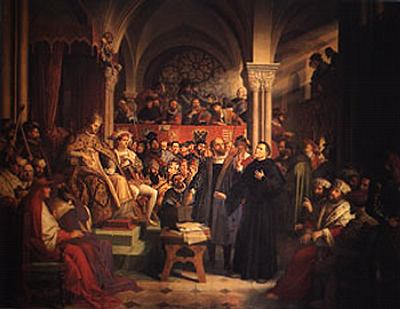
But the islamic
uniformity and one-sidedness of
that option was thus to the logic
of the fields of human action also
doomed to perish
(fundamentalistically). With the
philosophy of Enlightenment came not
just the Church to a fall but also
Islam and was she, since the
historical turning-point of the
siege of Vienna in 1683 where the
Ottoman rule of Islam was defeated
by the polish king Jan III
Sobiesky
(1629-1696), assigned her further
as historical to be denoted use
and position. The idea of
enlightenment which, in a violent
manner facing itself politically,
in the enlightened democracy of
today still finds it's expression
in the motto of the European Union
of 'oneness in diversity', was not
an original idea of Martin Luther
though, who only from a sober and
self-responsible properly being
versed in the scripture in a
reformatory way had preached
against the indulgences, and not
so much had aimed at a diversity
of religious and scientific
practices. Also for him there was
but one Lord. The notion of
oneness in diversity in the
enlightened multicultural sense we
find back, these days politically
with the modern rise of the spirit
of democracy, with another
religious reformer of the period:
the vaishnava saint and avat‚ra
S'rÓ
Caitanya Mah‚prabhu
(1486-1543), who with that motto
in India had attacked the false
authority of as well the also
there dominating rule of Islam,
the dry theology of books and the
caste-system. He was the factual
Lord of that notion of
enlightenment and it was He who
put forward as being the most
important Bible in that theology
the S'rÓmad
Bh‚gavatam or the Bh‚gavata
Pur‚na as being
the one essential story of the
person of God as being the
Fortunate One, which had flowed
from the hand of our filognostic
philosopher of duty Vy‚sa. 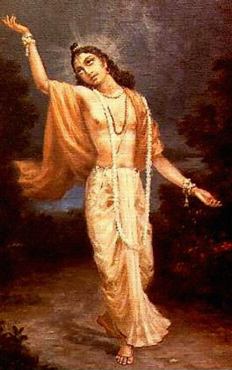 Even
though Luther defended a principle
of religious purification, still
was his ego-motivated effort for a
Bible readable to each, the not
cherishing of any celibate
preference and not selling of
indulgences any longer, a material
effort. The principle of the
spiritual union of the church
founded on the, in fact gnostic,
sanctity and sainthood, which one
indeed rarely finds with normal
and also clerical mortals, was
dropped by him as being impure.
And that made his action material.
He was of no mercy with the
material digression of the unholy
fathers of the church, but was
with the neglect of the sanctity
of the spiritual union himself a
materialist also; or, as the guru
Osho it in so many words explained
to his 'new men': 'the one saying
no is not free from it yet'. With
Luther we can observe how
fundamentalism - see also the
page about the fields with part
one - itself
is also a form of materialism: in
pushing itself off against the
more moderate, political
'materialistic' people of
compromise and with the exclusion
and even killing of alleged
sinners do they, just as catholic
contrareform itself also again
did, make for a false ego not
really willing to be of sacrifice
for the needed reconciliation.
Religious fanaticism is there of a
lack of philosophy so explained
one day Swami
A.C. Bhaktivedanta Prabhup‚da
(1896-1977), the
leader of the Hare
Krishna's to them,
one day sighing about the reprove
at their address of being
sectarian. And too much of
philosophy gives one the dry,
loveless books-estrangement of the
scientists, he added thereto.
Therewith seemed also of the
sanctity the austerity in
celibacy, that is not just
respected by the catholic orders,
but also, together with the
analysis, the penance and the yoga
is respected in India as a holy
principle of spiritual knowledge,
altogether false with the fall of
catholic Rome. Martin Luther
though being a hero, was not a
saint in this sense. He had, be it
with some difficulty and noble
protection, like a Jesus not to
carry the cross of violence of the
Reformation which indeed had to be
carried by the monasterial
celibates who were persecuted here
and there, whether they were
corrupt or not. In fact was that
cross in that period of spiritual
confusion about the norms and
standards on the shoulders of Lord
Caitanya, who with his grace for
the karma of philosophical
scholarship and religious
sanctimoniousness also for real
sacrificed his sane mind (and
before that his marriage) and thus
for that matter may be considered
the Christ of it. Luther married,
not sacrificing his sane mind for
the sake of his devotion to God,
simply modestly and in solidarity
with the common man, with a by the
populace from her convent banished
nun. With him, and the rest of the
thus reacting Christians - as for
the mob follows the leader -
flared up in that thus found
material self-interest of a
simple, but sacramentally also
commendable and not unholy, Even
though Luther defended a principle
of religious purification, still
was his ego-motivated effort for a
Bible readable to each, the not
cherishing of any celibate
preference and not selling of
indulgences any longer, a material
effort. The principle of the
spiritual union of the church
founded on the, in fact gnostic,
sanctity and sainthood, which one
indeed rarely finds with normal
and also clerical mortals, was
dropped by him as being impure.
And that made his action material.
He was of no mercy with the
material digression of the unholy
fathers of the church, but was
with the neglect of the sanctity
of the spiritual union himself a
materialist also; or, as the guru
Osho it in so many words explained
to his 'new men': 'the one saying
no is not free from it yet'. With
Luther we can observe how
fundamentalism - see also the
page about the fields with part
one - itself
is also a form of materialism: in
pushing itself off against the
more moderate, political
'materialistic' people of
compromise and with the exclusion
and even killing of alleged
sinners do they, just as catholic
contrareform itself also again
did, make for a false ego not
really willing to be of sacrifice
for the needed reconciliation.
Religious fanaticism is there of a
lack of philosophy so explained
one day Swami
A.C. Bhaktivedanta Prabhup‚da
(1896-1977), the
leader of the Hare
Krishna's to them,
one day sighing about the reprove
at their address of being
sectarian. And too much of
philosophy gives one the dry,
loveless books-estrangement of the
scientists, he added thereto.
Therewith seemed also of the
sanctity the austerity in
celibacy, that is not just
respected by the catholic orders,
but also, together with the
analysis, the penance and the yoga
is respected in India as a holy
principle of spiritual knowledge,
altogether false with the fall of
catholic Rome. Martin Luther
though being a hero, was not a
saint in this sense. He had, be it
with some difficulty and noble
protection, like a Jesus not to
carry the cross of violence of the
Reformation which indeed had to be
carried by the monasterial
celibates who were persecuted here
and there, whether they were
corrupt or not. In fact was that
cross in that period of spiritual
confusion about the norms and
standards on the shoulders of Lord
Caitanya, who with his grace for
the karma of philosophical
scholarship and religious
sanctimoniousness also for real
sacrificed his sane mind (and
before that his marriage) and thus
for that matter may be considered
the Christ of it. Luther married,
not sacrificing his sane mind for
the sake of his devotion to God,
simply modestly and in solidarity
with the common man, with a by the
populace from her convent banished
nun. With him, and the rest of the
thus reacting Christians - as for
the mob follows the leader -
flared up in that thus found
material self-interest of a
simple, but sacramentally also
commendable and not unholy,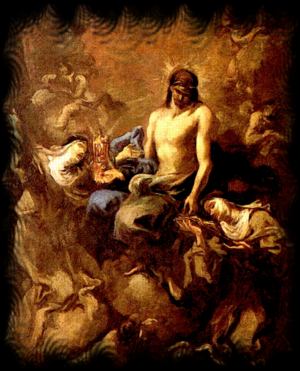 desire
for offspring, a political
struggle in the period that would
fuel many wars more on the way to
what we now, in search for the
factual authority of reform and
the notion of enlightenment, call
the ideal of democracy. Fine, so
be it, Luther we thus mustn't hold
responsible for the dissension of
the Reformation opposing the
Contrareformation, and so he
didn't think of it himself either.
Of course may only the Lord
himself reform His own religion
and not just a human being with
material needs like Luther who was
but the immediate cause. From
Luther we may learn that normal
karmic persons cannot exist in the
spirit only, but also have to
carry a material burden with the
democratic notion of the equality
of being one in diversity; a
notion which thus with Vy‚sa in
the Bhagavad
GÓt‚ already
thousands of years before was
called ekatvena prithaktvena
bahuda and with Caitanya
anew was preached as the end
conclusion that says acintya
bhed‚bheda tattva: an
inscrutable reality of oneness in
diversity. desire
for offspring, a political
struggle in the period that would
fuel many wars more on the way to
what we now, in search for the
factual authority of reform and
the notion of enlightenment, call
the ideal of democracy. Fine, so
be it, Luther we thus mustn't hold
responsible for the dissension of
the Reformation opposing the
Contrareformation, and so he
didn't think of it himself either.
Of course may only the Lord
himself reform His own religion
and not just a human being with
material needs like Luther who was
but the immediate cause. From
Luther we may learn that normal
karmic persons cannot exist in the
spirit only, but also have to
carry a material burden with the
democratic notion of the equality
of being one in diversity; a
notion which thus with Vy‚sa in
the Bhagavad
GÓt‚ already
thousands of years before was
called ekatvena prithaktvena
bahuda and with Caitanya
anew was preached as the end
conclusion that says acintya
bhed‚bheda tattva: an
inscrutable reality of oneness in
diversity.
A computer
is nothing w ithout an operating
system and a therein operating
program, and so it is also the
other way around. So also is man
not really man without a mutually
agreed upon peace-loving societal
order and a personal conviction or
spirit evolved therein, making for
the integrity and the functioning
of the person in that system. And
thus is there also with the
necessary negation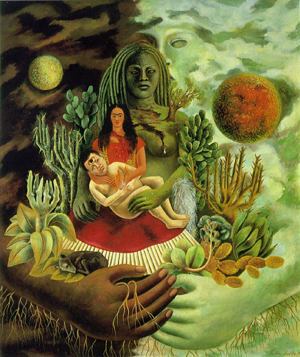 of the
inescapable ego with it something
like the being attached to the
goodness of the platonic God with
which we cannot as easily abandon
the selfhood that manifests itself
time and again with the normal
mortal that is karmically
connected to mother earth, so that
more values are needed than just
the one of goodness to do justice
to God in terms of eternal values.
With Lord Caitanya as the actual
Lordship of Reform and defender of
the philosophy of Vy‚sadeva, we so
find therefore, next to his very
emotional relations or mellows (rasas)
with the holy name that in ecstasy
was sung by him, the s'uddha
sattva values of the s'auca,
tapas, sathya and d‚ya
as explained by Vy‚sa (in S.B.
1.17: 24), or the
need of the respectively with the
to the values with the good of God
finding of the purity of body and
mind, penance, truthfulness and a
nature-loving compassion. For the
goodness with oneself without
compassion might imply violence
against others (including plant
and animal); might imply a lack of
penance in not sharing with
'lesser ones'; might imply a lie
in the description of reality
because of which the goodness in
fact turns out to be an illusion;
and, with a lusty type of goodness
being estranged and lonesome,
imply the faithlessnesss of the
inability to live the
connectedness; or as Vy‚sa puts
it: (S.B.
11.25: 35) 'Being
connected should he also, free
from depending on it, conquer the
goodness so that he, with his
intelligence pacified in being
liberated from the gunas, as an
individual soul giving up on the
cause of his being conditioned,
achieves Me.' of the
inescapable ego with it something
like the being attached to the
goodness of the platonic God with
which we cannot as easily abandon
the selfhood that manifests itself
time and again with the normal
mortal that is karmically
connected to mother earth, so that
more values are needed than just
the one of goodness to do justice
to God in terms of eternal values.
With Lord Caitanya as the actual
Lordship of Reform and defender of
the philosophy of Vy‚sadeva, we so
find therefore, next to his very
emotional relations or mellows (rasas)
with the holy name that in ecstasy
was sung by him, the s'uddha
sattva values of the s'auca,
tapas, sathya and d‚ya
as explained by Vy‚sa (in S.B.
1.17: 24), or the
need of the respectively with the
to the values with the good of God
finding of the purity of body and
mind, penance, truthfulness and a
nature-loving compassion. For the
goodness with oneself without
compassion might imply violence
against others (including plant
and animal); might imply a lack of
penance in not sharing with
'lesser ones'; might imply a lie
in the description of reality
because of which the goodness in
fact turns out to be an illusion;
and, with a lusty type of goodness
being estranged and lonesome,
imply the faithlessnesss of the
inability to live the
connectedness; or as Vy‚sa puts
it: (S.B.
11.25: 35) 'Being
connected should he also, free
from depending on it, conquer the
goodness so that he, with his
intelligence pacified in being
liberated from the gunas, as an
individual soul giving up on the
cause of his being conditioned,
achieves Me.'
The
personal part of our filognosy
thus commences with the individual
story of this writer. Not that my
small I-ness would be that
important, but because my person
knows the history which
illustrates this development of
being attached to the good, 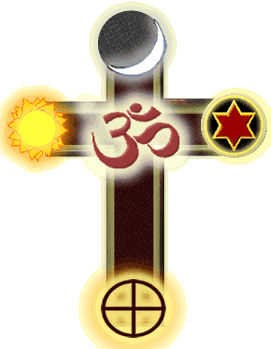 towards
the being detached in the goodness
which is so essential to the
progress of escaping from the
prison and the hopeless stupidity
of civil attachments. For the
question at hand is here: how in
God's name does one get as far as,
e.g., a Christian to occupy
oneself with Hinduism, the
inevitable cultural consequence of
respecting Vy‚sa? What exactly was
the need thereof, how does such a
life-experience build up? Of
course am I personally but one of
the many examples of people who,
lost in modern time, had to
reconsider things for themselves
with the notion that the classical
order of christian society is not
quite fully of understanding and
prepared to welcome someone with
all the twists of our modern fate.
The order of the world is the
order of the world and
Christianity, like Judaism and
Islam is but a historical part of
it, however indispensable they on
themselves are for so many. And so
met the writer of this in his
life, departing from the christian
cross, with other cultures of the
sun, moon, order and gnosis, who
contributed in the love for the
knowledge which in the end
amounted to the filognosy of this
site. The ongoing realization with
this was that repressive progress,
the evolution at the cost of
previous developments, constitutes
no real progress. A tree is
healthy together with its roots
and so is our political,
democratic and postmodern,
enlightenment healthy with the
vedic root, even though it is,
like the GÓt‚ (15: 1-4) puts
it, a tree up side down that with
it's roots touches the sky, and
with which one has to break in the
end when the jog is done and the
tools may be cleared away. One
gains experience all together and
everything else that is found with
it simply complicates the matter.
The fact that there are material
improvements taking place as e.g.
the tape-recorder finding digital
recording technologies or of the
phone evolving into the
communication over the internet,
doesn't mean that that culture or
school of learning of the medium
that historically preceded another
institute of civilization wouldn't
be of any use anymore or wouldn't
have a right to exist any longer.
The vinyl-record is still around,
despite of CD's and also is the
radio still there despite of the
t.v. Despite of the internet are
there still books and despite of
Christianity is there still
Judaism too, just like the culture
is still around of the 'sons of
God' towards
the being detached in the goodness
which is so essential to the
progress of escaping from the
prison and the hopeless stupidity
of civil attachments. For the
question at hand is here: how in
God's name does one get as far as,
e.g., a Christian to occupy
oneself with Hinduism, the
inevitable cultural consequence of
respecting Vy‚sa? What exactly was
the need thereof, how does such a
life-experience build up? Of
course am I personally but one of
the many examples of people who,
lost in modern time, had to
reconsider things for themselves
with the notion that the classical
order of christian society is not
quite fully of understanding and
prepared to welcome someone with
all the twists of our modern fate.
The order of the world is the
order of the world and
Christianity, like Judaism and
Islam is but a historical part of
it, however indispensable they on
themselves are for so many. And so
met the writer of this in his
life, departing from the christian
cross, with other cultures of the
sun, moon, order and gnosis, who
contributed in the love for the
knowledge which in the end
amounted to the filognosy of this
site. The ongoing realization with
this was that repressive progress,
the evolution at the cost of
previous developments, constitutes
no real progress. A tree is
healthy together with its roots
and so is our political,
democratic and postmodern,
enlightenment healthy with the
vedic root, even though it is,
like the GÓt‚ (15: 1-4) puts
it, a tree up side down that with
it's roots touches the sky, and
with which one has to break in the
end when the jog is done and the
tools may be cleared away. One
gains experience all together and
everything else that is found with
it simply complicates the matter.
The fact that there are material
improvements taking place as e.g.
the tape-recorder finding digital
recording technologies or of the
phone evolving into the
communication over the internet,
doesn't mean that that culture or
school of learning of the medium
that historically preceded another
institute of civilization wouldn't
be of any use anymore or wouldn't
have a right to exist any longer.
The vinyl-record is still around,
despite of CD's and also is the
radio still there despite of the
t.v. Despite of the internet are
there still books and despite of
Christianity is there still
Judaism too, just like the culture
is still around of the 'sons of
God' 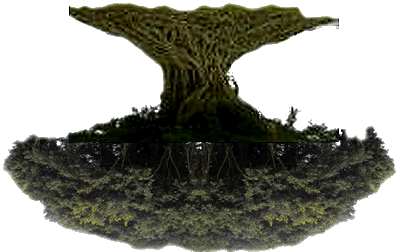 who
arriving from beyond the mountains
- possibly the far east thus -
exerted their influence upon the
Jews, like the Bible-book Genesis
describes it in the chapter on the
Ancient Times. So too do we later
on in the political section arrive
at the conclusion that with
respect for a certain history of
the norms and standards we simply
have to count with the different
views there are in the world and
that we so also have to count with
the different personalities,
divine or not, like they are taken
together filognostically at this
site (and in the
book thereof) with
the different sections mentioning
them. In fact is only
non-repressively operating the
respect found for the human rights
and a proper idea of emancipation
in de direction of the beatitude,
and so is it safe to say that only
with a syncretic approach, a kind
of filognosy as expounded here, a
realistic respect for the person
and his association and a politics
of mutual commenting is possible
that offers a future to all. The
repression that was born from a
lack of talent leads corrupting to
dictatorship, but the filognosy
that leads to respect for all the
different views leads, as was
described already in the Small
Philosophy of Association, to the
balance of a true democracy, to a
more at the human identity of the
soul directed representative
democracy which no longer defeats
itself, just like a couple of
football-teams all the time do,
with a new option of sovereignty
with every election. who
arriving from beyond the mountains
- possibly the far east thus -
exerted their influence upon the
Jews, like the Bible-book Genesis
describes it in the chapter on the
Ancient Times. So too do we later
on in the political section arrive
at the conclusion that with
respect for a certain history of
the norms and standards we simply
have to count with the different
views there are in the world and
that we so also have to count with
the different personalities,
divine or not, like they are taken
together filognostically at this
site (and in the
book thereof) with
the different sections mentioning
them. In fact is only
non-repressively operating the
respect found for the human rights
and a proper idea of emancipation
in de direction of the beatitude,
and so is it safe to say that only
with a syncretic approach, a kind
of filognosy as expounded here, a
realistic respect for the person
and his association and a politics
of mutual commenting is possible
that offers a future to all. The
repression that was born from a
lack of talent leads corrupting to
dictatorship, but the filognosy
that leads to respect for all the
different views leads, as was
described already in the Small
Philosophy of Association, to the
balance of a true democracy, to a
more at the human identity of the
soul directed representative
democracy which no longer defeats
itself, just like a couple of
football-teams all the time do,
with a new option of sovereignty
with every election.
First of
all is it with this outlook thus
of importance to offer my own
story as an example and as a
proof of the viability and
necessity of the filognosy for
each. Even though not everyone
shares the same - and thus
better to recognize - experience
or evolution in life, even
though there are many roads that
lead to the same political Rome
of the actual respect for the
person,  still
is every path traveled a gate to
the future to the disposition of
each. That is the proven use of
a self-description one just as
well may consider a failure of
the dominance of the false ego
as a success in selfrealization
in the interest of the greater
soul of the world population in
it's entirety and God with all
living creatures and universes
to it in particular. To begin
with myself are there two pages
with sayings. First a page with
quotes of
people other than me, the way I
happened to find them left and
right about in particular the
subject of time and the order of
wisdom. Like the aphorisms on the
next page that came to me as
separate ideas, must they, not
always wise or even hilarious as
they are at times, not all be
taken as serious. The page with
my own sayings is called the Gray
Page for
that reason. They are partly
absurd thoughts, impulses or
emotional expressions sometimes
just meant for fun or to serve
another emotional reason. After
having presented myself on a
next page in the section called
The
Mirror of Tim' where
I tell the story of how I
arrived at my filognostical
sense of order, is there room
for a page on which I further
deliberate on gurus
and therapists and
focus on the special
incarnations of God in the
present age. Next follows a page
about the idea of time
realized religiously, the
way one sees it with the
different world religions, and
is there as an introduction to next
section a page
about my
personal struggle with the
times of the modern political
quarrel. What
follows next is a page
specifically about the Game
of Order, a
complete site in itself, that
everybody has to learn to play
if he wants to consider himself
a winner and an committed person
- as far as I am concerned a
filognostic. At last is there a
page about the
basis of vedic knowledge on
which this entire site actually
was built. It's beyond the scope
of this site to deal extensively
with the complete of the
vedantic commentary written by
Vy‚sa, but with a general
introduction to that flute in
the hands of Krishna, his hero
and Lordship, and the discussion
of a couple of elementary
chapters and nuclear verses
which especially emphasize the
connection between the order of
time and the person of God, will
religiously committed this
section be completed. still
is every path traveled a gate to
the future to the disposition of
each. That is the proven use of
a self-description one just as
well may consider a failure of
the dominance of the false ego
as a success in selfrealization
in the interest of the greater
soul of the world population in
it's entirety and God with all
living creatures and universes
to it in particular. To begin
with myself are there two pages
with sayings. First a page with
quotes of
people other than me, the way I
happened to find them left and
right about in particular the
subject of time and the order of
wisdom. Like the aphorisms on the
next page that came to me as
separate ideas, must they, not
always wise or even hilarious as
they are at times, not all be
taken as serious. The page with
my own sayings is called the Gray
Page for
that reason. They are partly
absurd thoughts, impulses or
emotional expressions sometimes
just meant for fun or to serve
another emotional reason. After
having presented myself on a
next page in the section called
The
Mirror of Tim' where
I tell the story of how I
arrived at my filognostical
sense of order, is there room
for a page on which I further
deliberate on gurus
and therapists and
focus on the special
incarnations of God in the
present age. Next follows a page
about the idea of time
realized religiously, the
way one sees it with the
different world religions, and
is there as an introduction to next
section a page
about my
personal struggle with the
times of the modern political
quarrel. What
follows next is a page
specifically about the Game
of Order, a
complete site in itself, that
everybody has to learn to play
if he wants to consider himself
a winner and an committed person
- as far as I am concerned a
filognostic. At last is there a
page about the
basis of vedic knowledge on
which this entire site actually
was built. It's beyond the scope
of this site to deal extensively
with the complete of the
vedantic commentary written by
Vy‚sa, but with a general
introduction to that flute in
the hands of Krishna, his hero
and Lordship, and the discussion
of a couple of elementary
chapters and nuclear verses
which especially emphasize the
connection between the order of
time and the person of God, will
religiously committed this
section be completed.
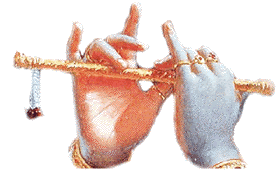
The
pictures:
- The
modern painting is of Mordecai Ardon and is called 'For
the fallen souls'; it is the
center piece called the 'Card
house' from a triptych of 1955 - '56. It is
painted in oil on canvas and is
part of the collection of the
Stedelijk Museum in Amsterdam.
- The picture
with the glasses and the book
indicates to what extend a book
equals a pair of glasses, works
like spectacles.
- The man
underneath is the
anti-psychiatrist R. D. Laing, from the sixties who
emphasized the environmental
factors of the societal system as
possible maddeners.
- The
picture of Christ is a painting of
Antonio da Correggio (1489 - 1534)
titled 'Christ presented to the
people' (Ecce Homo); it is
from 1525-30 and consists of oil
on a panel measuring 99.7 x 80 cm,
and is situated in the National
Gallery of London.
- The picture of
the bust is an etching of Gustave
Dorť (1832 - 1883) and shows
Baron von MŁnchhausen. A literary character known for his
grandiose adventures. His story
was also filmed by Jerry
Gilliam.
- The Buddha
is a picture of Maha-Asta
Caitya, the great teacher of
inner renouncement, it is from
Khara Khoto, Central Asia. It is
from before 1227 from the Tangut
Dynasty and can be found in the
Hermitage Museum.
- The nun
with the poor child is Mother
Theresa (1910 - 1997), the holy
Sister of Compassion doing her
charitable work in India.
- Underneath a
portrait of Martin Luther (1483 -
1546), painted by Lucas Cranach
der ńltere in 1529. Luther was the
theologian overturned the catholic
order with his struggle against
the corruption of the church with
her indulgences. He translated the
english text from the Bible in
German and thus popularized the
text. He is considered the leader
of the Christian Reformation.
- The painting
with the monk shows Luther during
the defense of his theses in the reichstag
in april 1521 in Worms in the
presence of emperor Karel V.
Luther refused to revoke anything
of what he had written.
- The
painter with the dancer shows Lord
Krishna Caitanya
Mah‚prabhu (1486-1543) who brought the reform
of vaishnavism which contested the
rule of Islam in India, the
caste-system and the dry
book-knowledge. His message was
'chant the names and spread the
message of the Bh‚gavatam'. In the West he is
known as the Lord of the Hare
Krishna's.
- The painting
of Christ with the nuns is of
Alessandro Magnasco (1667-1749),
and is called 'Christ Adored by
Two Nuns' and is from 1715,
oil on canvas, 58 x 43 cm, at home
in the Galleria dell'Accademia in
Venice.
- The
green painting of mother earth
with her grip on the person is of
Frida Kahlo and named 'The Love
Embrace of the Universe, the
Earth (Mexico), Me, and Senor
Xolotl', and is of 1949, oil
on canvas, 27 1/2 x 23 7/8 and can
be found in the Collection of
Jorge Contreras Chacel in Mexico
City.
- The
picture below represents the
filognostic cross in which the pranava
as the form and yoga-mantra of
God, the sun, the moon and the
celestial sky is respected on the
basis of the gnosis that mediates
in the relation between science
and religion.
- The tree
upside down is a banyan
representing the knowledge of the
world which roots in the heaven of
transcendence.
- The gate
with the light opens one's eye for
the still unknown but brilliant
future reserved for the person of
good will in the filognosy.
- The hands
with the flute represent the hands
of Lord Krishna who bedazzles us
with His love for the harmony of
nature.
Footnote:
2: DikŤ: personification
of justice considered the daughter
of Zeus and Themis.
De
site lineair als een perfectie
van de causale illusie:


|